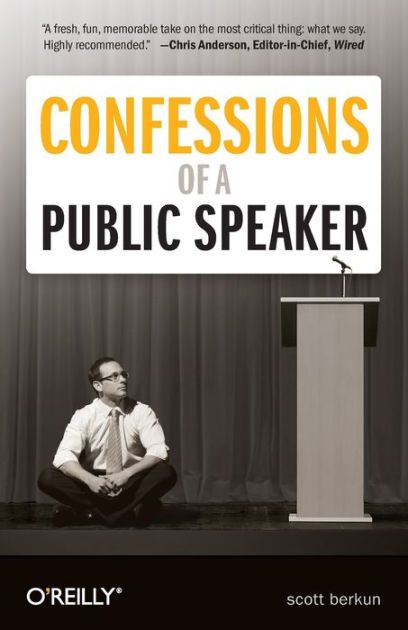Confessions of a Public Speaker – Scott Berkun

Scott Berkun’s Confessions of a Public Speaker is a practical and hilarious book that presents these powerful and evidence-based techniques that many people can borrow to share ideas with others and eventually become great communicators: continuous improvement, efficient preparation, practice, and getting timely feedback.
If you’d like to be good at something, the first thing to go out the window is the notion of perfection.
Tell The Audience Your Plan
You can say, “I have 30 minutes to talk to you and five points to make. I will spend five minutes on each point and save the remaining time for any questions.”
That takes about ten seconds to say, but for that small price, you continue to own the attention of the room because they know the plan.
Your Response
Know that your response to a mistake defines the audience’s response.
If you respond to spilling water on your pants as if it were the sinking of the Titanic, the audience and you will see it as a tragedy. But if you’re cool, or better yet, find it funny, the audience will do the same.
What The Audience Want
It’s often the case that the things speakers obsess about are the opposite of what the audience cares about. They want to be entertained. They want to learn. And most of all, they want you to do well.
Ways to Reduce Physical Stress and Nervousness
Getting to the venue early so you don’t have to rush
Doing tech and sound rehearsal well before your start time
Walking around the stage so your body feels safe in the room
Sitting in the audience so you have a physical sense of what they will see
Eating early enough so you won’t be hungry, but not right before your talk
Talking to some people in the audience before you start (if it suits you), so it’s no longer made up of strangers (friends are less likely to try to eat you).
Pre-Speaking Mistakes and Assumptions
Many of the mistakes you can make while performing do not prevent those things from happening. It’s the mistakes you make before you even say a word that matter more. These include the mistakes of not having an interesting opinion, not thinking clearly about your points, and of not planning ways to make those points relevant to your audience.
Minimize Your Public Speaking Fears
We can minimize most of these fears by realizing that we speak in public all the time.
You’re already good at public speaking — the average person says 15,000 words a day.
People come to hear someone because they:
- Want to learn something
- Wish to be inspired
- Hope to be entertained
- Have a need they hope you will satisfy
- Desire to meet other people interested in the subject
- Seek a positive experience they can share with others
- Are forced to be there by their bosses, parents, professors, or spouses.
Enforcing A Guideline
When you enforce a popular rule, you re-engage everyone who supports that rule. You restore your power and earn the audience’s respect. So, don’t hesitate to cut off a blowhard, silence the guy on his cell phone, and interrupt the table by having a private but distracting conversation. As long as you are polite and direct, you’ll be a hero.
A Little Fear Is Good
If you pretend to have no fear of public speaking, you deny yourself the natural energy your body is giving you. Anxiety creates a kind of energy you can use, just as excitement does.
Ian Tyson, a stand-up comedian and motivational speaker, offered this gem of advice: “The body’s reaction to fear and excitement is the same… so it becomes a mental decision: am I afraid or am I excited?
I don’t practice to make perfect, and I don’t memorize. If I did either, I’d sound like a robot, or worse, like a person trying very hard to say things in an exact, specific, and entirely unnatural style, which people can spot a mile away. My intent is simply to know my material so well that I’m very comfortable with it. Confidence, not perfection, is the goal.

